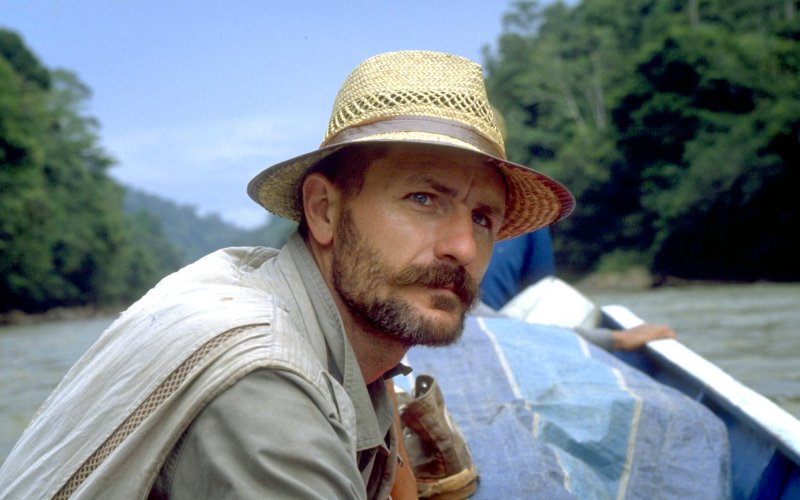Author and filmmaker Robert Young Pelton has made a career out of traveling through the world’s most dangerous places. His recent journeys have taken him to the siege of Grozny in Chechnya, the battle of Qala-I-Jangi in Afghanistan, and Baghdad’s “RPG Alley”. He has been kidnapped by right wing death squads in Colombia, survived a plane crash in Indonesia, and gracefully endured numerous detainments and attacks. He is perhaps most famous for his world exclusive interview of the American Taliban, John Walker Lindh, in December of 2001.
In addition to writing a regular column for National Geographic Adventure, Pelton has worked for Discovery Channel, National Geographic Channel, ABC News, CBS 60 Minutes, CNN and other major media networks. As an author, Pelton is best known for his classic underground guide to surviving danger; Robert Young Pelton’s The World’s Most Dangerous Places, now in its fifth edition. His other books include Come Back Alive, The Adventurist, and Three Worlds Gone Mad. His newest book, Licensed to Kill: Privatizing the War on Terror, a book about mercenaries and private contractors, is due out in March of 2006.
How did you get started traveling?
I lived in a car when I was 16. I couldn’t afford an apartment but I could afford $150 for a tired pink 1962 Rambler Classic Cross Country. Living in a car is called being homeless, but when you drive around and pick fruit for a living it’s called traveling.
How did you get started writing?
I began as a copywriter when I was 17 in Toronto, working for the ad agency BBDO. I had been promoted from my lowly position in the mailroom. I left a few months later to take a leave of absence and travel around the world. I used to keep small vinyl diaries just to remember what I did. I am the first to admit that I am uniquely qualified not to be a writer; it just seems that sometimes I am the only guy left alive who managed to write things down.
What do you consider your first “break” as a writer?
I wanted to join the Camel Trophy but they didn’t have a Canadian team. The Camel Trophy was an annual event in which teams from around the world competed by driving through some of the world’s most hostile natural environments in Land Rovers. I found out that there were two seats in the back for journalists, and since some countries used ringers pretending to be journalists, I offered to join as a journo. I published my story in Soldier of Fortune and a number of other magazines of ill repute and I suddenly was a writer. I’d never really had any ambitions to be a travel writer.
As a traveler and fact/story gatherer, what is your biggest challenge on the road?
I travel mostly in active war zones with insurgents, rebels and people who kill other people for a living. Gaining their trust and staying alive are probably the two most critical skills.
What is your biggest challenge in the research and writing process?
You have to balance the confusion of warfare with after-the-fact research. Often the media gets it wrong, and years later you feel vindicated. I also hate the process of sitting on my ass staring at a computer compared to the travel and experience process. Accordingly I have done a number of very interesting things I have never bothered to write about.
What is your biggest challenge from a business standpoint? Editors? Finances? Promotion?
I enjoy working with good editors like Kathy Huck at HarperCollins, David Dunbar at Adventure (now at Popular Mechanics), and Christina Davidson on my new book. It’s a love-hate relationship that instills discipline and makes me sound half intelligent.
Have you ever done other work to make ends meet?
I am multi-hypen these days: Adventurer, filmmaker, businessman, author, writer, director, lecturer, columnist, host, explorer, executive producer, photographer, pundit, vagrant and student of life. In my past life I have been a lumberjack, blaster, boundary cutter, ad spokesman, copywriter, hostage, marketing guru, hardware store manager, and bounty hunter. Lets just say I get bored easily, and writing is a broad enough excuse to do something interesting, get into trouble, and see what happens.
What travel authors or books might you recommend and/or have influenced you?
I suppose the classical format of Homer, Ibn Battuta, Sir Richard Burton and other doer/writers inspires me. I also wish I was as funny and professional as Tim Cahill, as mainstream popular as Bill Bryson and as literary as Paul Theroux. But honestly, I just do my thing and if people dig it that’s good. If they don’t — well, as one of my favorite irate fan letters said: “I hated your book so much I am never going to check it out from the library again.”
What advice and/or warnings would you give to someone who is considering going into travel writing?
Don’t. It’s like the label “war correspondent’. You either write or you don’t. My advice to people who aspire to be me is to stop whining and just do it. Everything falls into place once you begin the process. If it doesn’t, there is always Wal Mart. Just write and use it as your passport to learning about the world.
What is the biggest reward of life as a travel writer?
Meeting and getting emails from hundreds of people who tell me how I changed their life. The people who cracked my secret code: That the world is not so scary and dangerous once you get out there.

